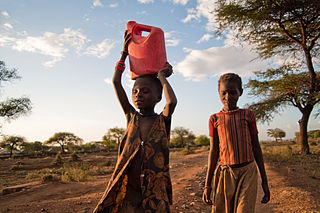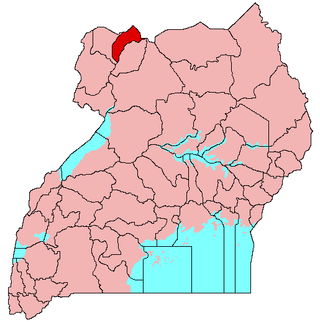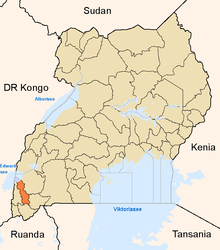
The Lango are a Nilotic ethnic group. They live in north-central Uganda, in a region that covers the area formerly known as the Lango District until 1974, when it was split into the districts of Apac and Lira, and subsequently into several additional districts. The current Lango Region now includes the districts of Amolatar, Alebtong, Apac, Dokolo, Kole, Lira, Oyam, Otuke, and Kwania. The total population of Lango District is currently about 2,884,000.

Culture of Uganda is made up of a diverse range of ethnic groups. Lake Kyoga forms the northern boundary for the Bantu-speaking people, who dominate much of East, Central, and Southern Africa. In Uganda, they include the Baganda and several other tribes

Rukungiri District is a district in the Western Region of Uganda. The town of Rukungiri is the site of the district headquarters.

Queen Elizabeth National Park is a national park in Uganda.

The Karamojong or Karimojong are a Nilotic ethnic group. They are agro-pastoral herders living mainly in the north-east of Uganda. Their language is also known as ngaKarimojong and is part of the Nilotic language family. Their population is estimated at 475,000 people.
The Gisu people, or Bamasaba people of Elgon, are a Bantu tribe and Bantu-speaking ethnic group of the Masaba people in eastern Uganda, closely related to the Bukusu people of Kenya. Bamasaba live mainly in the Mbale District of Uganda on the slopes of Mount Elgon. The Bagisu are estimated to be about 1,646,904 people making up 4.9% of the total population according to the 2014 National Census of Uganda.

The Gwere people, also called Bagwere, are a Bantu ethnic group in Uganda. They are among the 65 ethnic societies of Uganda. Gwere is the root word, and the people are referred to as Bagwere (endonym) or Mugwere (singular). According to the 2002 Census of Uganda, 23.6% of Bagwere are Roman Catholic, 46.8% are Anglican, 23.9% are Muslim and 3.1% are Pentecostal.
Kiga people, or Abakiga, are a Bantu ethnic group native to south western Uganda and northern Rwanda.
Rukungiri is a town in Rukungiri District of the Western Region of Uganda. It is the site of the district headquarters.
Mitooma, also Mitoma, is a town in the Western Region of Uganda. It is the main municipal, administrative, and commercial center of Mitooma District.

Kigezi sub-region is a region in Western Uganda that consists of the following districts:

The Jie are an ethnic group in Uganda. They belong to the Karamojong Cluster, which also includes the Karamojong and Dodoth people. Their country in northeast Uganda lies between the Dodoth to the north and the Karamojong to the south.
The Songora or Shongora are a traditionally pastoralist people of the Great Lakes region of Central Africa located in Western Region, Uganda and Eastern Democratic Republic of the Congo. They have distinctive customs and speak Rusongora, a Bantu language that is similar to Runyankole and Runyoro. The Basongora population in Uganda was reported at numbering 15,897 people in the 2014 census. Although various community estimates put their population at around 40,000 and 50,000 people. Some Basongora also live in Eastern Congo.

The Acholi people are a Nilotic ethnic group of Luo peoples, found in Magwi County in South Sudan and Northern Uganda, including the districts of Agago, Amuru, Gulu, Kitgum, Nwoya, Lamwo, Pader and Omoro District. The Acholi were estimated to number 2.3 million people and over 45,000 more were living in South Sudan in 2000.
Medius Kaharata Natukunda is a Ugandan politician and woman member of parliament. In 2021, she was elected as a woman representative in parliament for Rukungiri District during the 2021 Uganda general elections.
Rukungiri Water Supply and Sanitation Project (RWSSP), also Rukungiri Water Supply and Sewerage System, is a water intake, purification, distribution and waste water collection and disposal system in the town of Rukungiri, in the Western Region of Uganda. When completed, the system is expected to supply 9,600 cubic meters (9,600,000 L) of water daily, to about 120,000 people in the town of Rukungiri and neighboring communities in Rukungiri District and to parts of Ntungamo District. The infrastructure development project is being jointly funded by the World Bank and the Government of Uganda.
Uganda is home to many tribes. Amongst these include the Reli Tribe. This is a minority ethnic group living in Itula sub-county, Obongi district, West Nile-Uganda.This indigenous community was recognized on 1 February 1926 and published in the Constitution of the Republic of Uganda.

Ethur tribe is one of Uganda's minority communities living in Abim District, located in northeastern Uganda. The Ethur people are herdsmen and practice goat rearing, cattle keeping and agriculture for their livelihood. They are subsistence farmers who sell or exchange products with neighboring tribes. Additionally, the Ethur people are potters and blacksmiths who make various products for sale to neighbouring tribes.

The Gimara tribe are a group of people living in Northern Uganda in Moyo District. Gimara is a sub-county in Uganda with 2 parishes and 17 villages. Considered as a minority tribe in Uganda, the government added Gimara tribe to be recognized in Uganda's constitution of 1995 as independent tribes.

The Shana people are a minority tribe in Eastern Uganda living in present-day Bulambuli District. They are believed to have migrated from western Uganda. The Constitution (amendment) Act 2005 added Shana as indigenous communities of Uganda.












